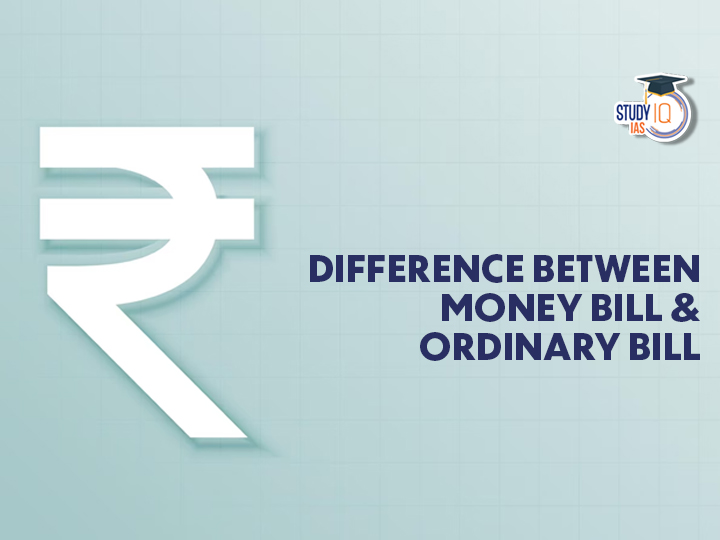Table of Contents
Difference Between Money Bill and Ordinary Bill
In the legislative process of a country, legislative bills play a crucial role in proposing and enacting laws. Two essential types of bills are often encountered – Money bills and Ordinary bill. Each type holds distinct characteristics and significance within the parliamentary system. Understanding the difference between Money Bill and Ordinary Bill, these two forms of legislation are vital to comprehend the legislative framework and its impact on the economy and governance.
In this article, we will delve into the difference between money bill and ordinary bill, shedding light on their distinct features and the procedures governing their passage through the legislative process.
What is Money Bill?
In parliamentary systems, including India, a Money Bill is a type of legislation that exclusively deals with financial matters and is introduced in the lower house of the parliament (e.g., the Lok Sabha in India). The concept of the Money Bill is derived from the principles of financial control and parliamentary sovereignty. Check here to know more about Money Bill in detail for UPSC exam preparation.
What is an Ordinary Bill?
An Ordinary Bill is a type of legislation that is introduced in the parliament or legislative assembly to address various matters other than financial issues. Unlike a Money Bill, which exclusively deals with financial matters, an Ordinary Bill covers a wide range of subjects and policy areas.
Major Difference Between Money Bill and Ordinary Bill
The major differences between a Money Bill and an Ordinary Bill lie in their nature, scope, and the specific procedures they undergo during the legislative process. Here is a table that highlights the Major Difference Between Money Bill and Ordinary Bill.
| Aspects | Money Bill | Ordinary Bill |
| Definition | A bill that exclusively deals with financial matters, taxes, government expenditure, borrowing, or the Consolidated Fund of India. | A bill that addresses general matters and policies, except for those related to financial issues. |
| Purpose | To give effect to the government’s financial proposals and budgetary allocations. | To address various social, economic, and administrative matters aimed at improving governance and society. |
| Procedure for Introduction | Only the Lok Sabha (House of the People) has the power to initiate money bills. The President may recommend the introduction of money bills to the Lok Sabha. Once introduced, the Speaker certifies it as a money bill. | Ordinary bills can be introduced in either the Lok Sabha or the Rajya Sabha, and both houses have equal legislative authority over them. There is no special recommendation required for the introduction of ordinary bills. The Speaker or Chairman does not certify ordinary bills. |
| Special Procedure | Money bills follow a specific procedure and are subject to a time constraint for consideration. | Ordinary bills do not require any special procedures and can be discussed and passed in the ordinary course of business. |
| Passage in Rajya Sabha | The Rajya Sabha (Council of States) can only make recommendations on money bills, but it cannot reject or amend them. If the Rajya Sabha fails to return the bill within 14 days, it is deemed to have been passed by both houses. | The Rajya Sabha has the power to suggest amendments to ordinary bills, and its concurrence is necessary for their passage. The Rajya Sabha can also withhold its consent for an ordinary bill, leading to its lapse. |
| Consent of State Legislative Council | Before introducing a money bill, the President shall obtain the recommendation of the Governor of the state. | The President’s recommendation is not necessary for the introduction or passage of ordinary bills. |
| Role of Lok Sabha | The Lok Sabha’s decision is final in case of a disagreement between the two houses on a money bill. | The Lok Sabha has the final say in the passage of ordinary bills. |
| President’s Approval | After being passed by the Lok Sabha, money bills are sent to the President for his/her approval. If the President gives assent, the bill becomes law. | After being passed by both houses, ordinary bills require the President’s assent to become law. |
| Lapse of Bill | If a money bill is not returned by the Rajya Sabha within 14 days, it is deemed to have been passed by both houses. Otherwise, it may be returned to the Lok Sabha for any suggested amendments. | If an ordinary bill is not passed by the Rajya Sabha or does not receive the President’s assent, it lapses and does not become law. |
| Scope of Discussion | The scope of discussion on money bills is limited to financial matters only. | Ordinary bills allow for in-depth debates and discussions covering a wide range of issues and perspectives. |
| Application | Money bills apply only to India and not to the states or Union territories. | Ordinary bills can apply to the entire country or specific states or Union territories, depending on their subject. |
| Example | The Finance Bill is a typical example of a money bill in India. | The Consumer Protection Bill is an example of an ordinary bill addressing consumer rights and protection. |
Difference Between Money Bill and Ordinary Bill for UPSC Exam
Understanding the difference between Money Bill and Ordinary Bill is crucial for the UPSC (Union Public Service Commission) examination as it falls under the Polity and Governance section of the UPSC Syllabus. Aspirants preparing for UPSC need to be well-versed in the legislative process and the constitutional provisions related to money bills and ordinary bills. A clear grasp of this topic will enable aspirants to answer questions related to the legislative procedures and financial decision-making in the country’s governance during the UPSC examination. Aspirants can understand such topics from UPSC Online Coaching and test their understanding by attempting UPSC Mock Test.


 SLAPP Suits: Meaning, Examples, Impact o...
SLAPP Suits: Meaning, Examples, Impact o...
 Finance Commission of India, Articles an...
Finance Commission of India, Articles an...
 High Number of Pending Cases in Supreme ...
High Number of Pending Cases in Supreme ...

























